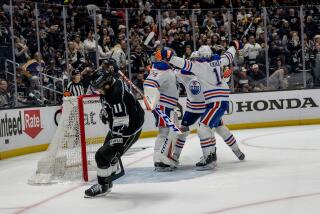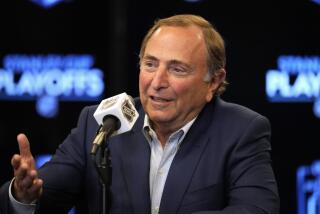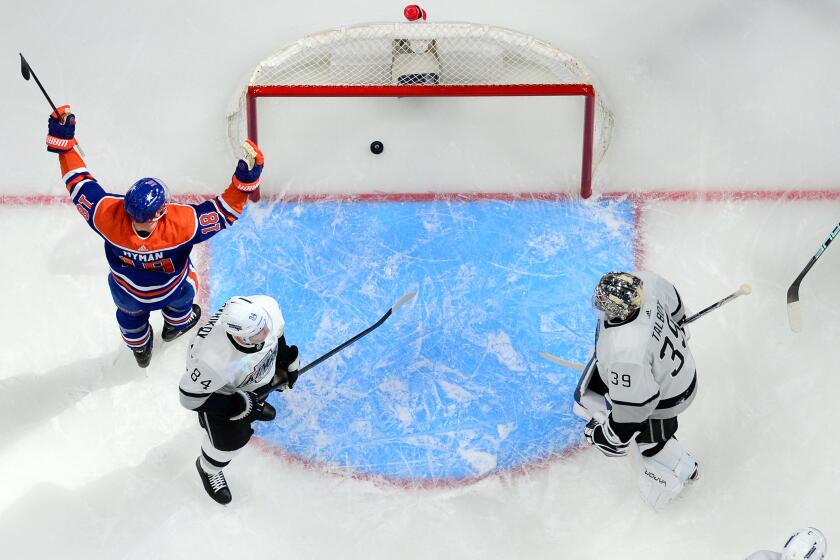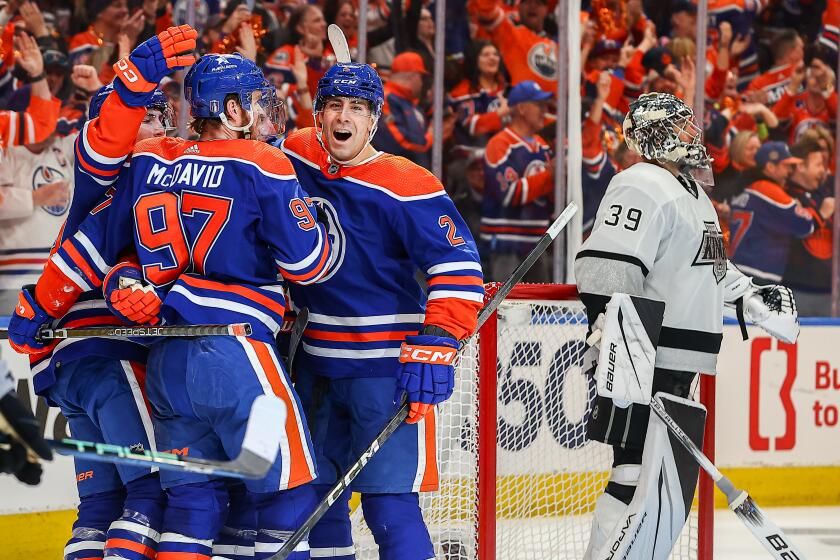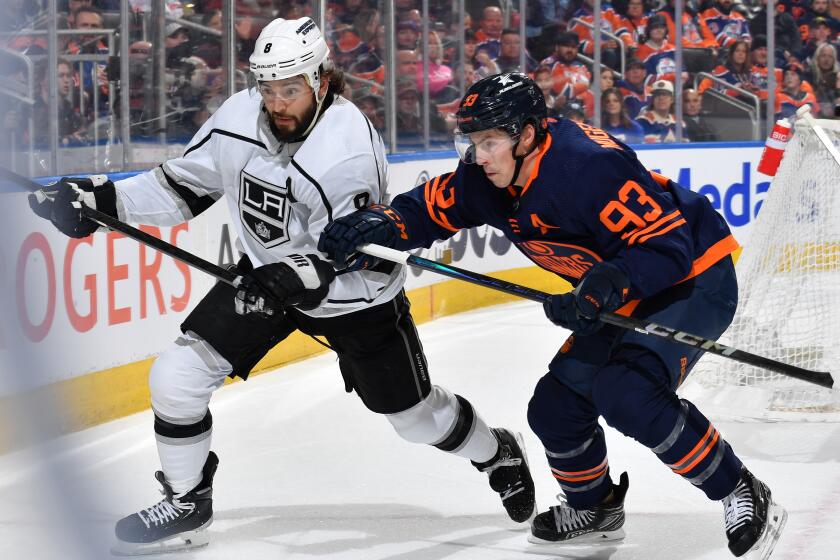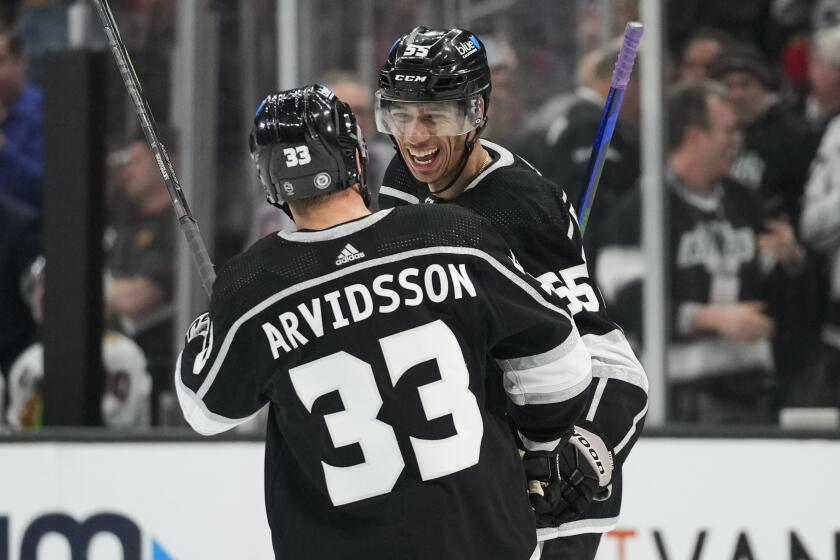Q & A with Gary Bettman
NHL Commissioner Gary Bettman, in Los Angeles for Game 4 of the Kings’ playoff series against the Vancouver Canucks at Staples Center Wednesday, addressed a variety of topics during an interview with The Times.
Question: Having the Kings in the playoffs after a long absence, having the L.A. market involved, what are your thoughts?
“It’s always good for the fans of a team. Any team. It’s always good for any organization to overcome the long droughts when a team hasn’t been as successful as everyone would have hoped.”
Q. Also having the draft here …
“It’s a coincidence. It’s good to be here. We’ve been planning it, as have the Kings, for a while, but we know that this is a market that will support hockey. We had a terrific All-Star Game here in 2002, when things were not as exciting as they are today. But you always have to look at these things for the long term.”
Q. Looking back at the situation the team was in when Phil Anschutz and AEG bought it, there’s been a dramatic turnaround in terms of stability. Competitiveness aside, stability.
“It’s interesting that you say that because I don’t think Phil Anschutz gets enough credit. That’s probably because he’s a private individual and the fact that he doesn’t choose to be out in the public doesn’t diminish the fact that he’s passionate about the team, and that since AEG bought the team….
“He has been there for the team in every way that mattered and he has been supporting the team financially and so to the extent, and it always amazes me when I read the stories, [how] this is the equivalent of corporate ownership where nobody cares, or it’s only about the money. They really aren’t looking at what’s happened here during the term that Phil Anschutz has owned this team, supported this team and made sure that the team has been stable.”
Q. I think that perception is fed by his choice to not be in the public.
“But he’s like that in all of his endeavors. It’s no different than any of the multitude of businesses that he owns. This is the way that he chooses to conduct himself, but I think ultimately he should be judged by the fact that he has always stood behind this team. And believe me, because over the years I’ve seen firsthand how he feels. He does not like losing.”
Q. Can you give an example of conversations that you might have had with him, issues important to him?
“It’s more that I know it pains him when the team isn’t successful.”
Q. At the moment, the issue that everyone seems to be looking at is the Coyotes. … If you can just update a little bit on where that situation stands. [The Coyotes are being operated by the NHL following their filing for bankruptcy. They’re in the process of being sold].
“The good news is the city approved a memorandum of understanding. That was a big step forward. But the process still has work that remains to be done. We remain optimistic that everybody’s going to do what they need to do, and it’s nice to see that the team has had success because it’s demonstrating, among other things, that people in the Valley of the Sun, will support a team that has credibility on the ice. And that people know how to get to Westgate.
“Hopefully it will all come together. We’ve put a lot of effort into stabilizing the team and doing what needed to be done last year. And hopefully the things that will need to get done in order to finalize all the arrangements that are necessary for the team will hopefully get done in the not too distant future.”
Q. Is there an ownership issue as well in Dallas, with Tom Hicks?
“I think first and foremost it’s been very public that Tom Hicks has been in a process to sell the [Texas] Rangers. I think it’s just been announced that there’s a process to sell Liverpool. And he’s made no secret that he’s looking at his options with respect to the Stars. I believe there are a lot of people who, if the team is ultimately to be sold, would be interested in buying the Stars.”
Q. They’re going through a down time competitively, but in terms of people supporting them, are they OK over the long term?
“I think the issues are less about the Stars than a more general issue with respect to Tom’s relationship to his banks. The team is doing OK. That team is not a concern.”
Q. Looking at the playoffs so far, so many games have been so close and so competitive. Home ice has not really been that huge an advantage. Is this ultimately what you envisioned in terms of parity and competitiveness?
“First and foremost, when you look at the games they have been hugely entertaining, and that, to us, is the most important thing about what happens on the ice. The fact that I think this is the first time in the history of the best-of-seven round in the first round that all series were tied at one tells you how competitive the game is. Which is no surprise coming out of the regular season. You talk to coaches and managers and players for a number of teams and they’ll tell you they’ve been in the playoffs for the last six weeks and we think that’s a function of a variety of things: The way the game is being played now, which is a function of the officiating standards and the rules changes, and it’s the fact that all teams can now afford to be competitive under the system we have.”
Q. You got a pretty good bounce coming out of the Olympics in terms of TV and other measurable factors. Is that accurate?
“In a difficult climate our business has been pretty strong this year. I don’t know that you can quite yet measure the impact of the Olympics. To me the Olympics is more about the kids who watched the gold medal game and decided they want to play hockey, not unlike what we saw from ’80 and that’s a longer-term thing. But the metrics surrounding our business have been strong this season but they’ve been strong for the last four seasons as well.”
Q. Do you envision revenues staying stable?
“We don’t have final accounting yet. Last year, the first part of the recession, we were up about 5% when we had, before the recession started, projected 7%. So we saw a little bit of an impact. I think we’re either going to be flat or up or down a percent or two, which is basically flat. In this environment this is pretty good, and relative to the other sports I understand that’s very good.”
Q. So that would affect the salary cap as well.
“One of the things, and I’m talking real revenues, native revenues, the Canadian dollar, which goes into the computation but isn’t a real economic factor, may change things a little bit because of its volatility but I don’t envision much change in the cap one way or the other.”
Q. In terms of labor relations with the players’ association, everybody looks at what’s going on over on their side, and that’s their business but what kind of relationship do you have right now with the PA [player’s association]?
“There’s really nobody who’s dealing with us on a day-to-day basis. They have some staff that are attending to things that need to be attended to, but in terms of the initiatives and major things that we might want to do, there’s really little structure for us to do it with, so we, like everybody else, are looking forward to a time where there will be a strong, stable union that can be a partner to work with us in growing the business.”
Q. Getting the headshots rule put in was fairly significant and it has the potential to change.
“I think it was important. Significant makes it sound like it was out of the blue. I think it was more evolutionary. We have been for years dealing with concussions and injuries and hits to the head and it’s been in very measured, studied ways. This was another step along that road. While there may have been two hits this year [on David Booth and Marc Savard] that helped expedite the process, I think it also helped to define what it is precisely what we needed to do.
“The concern had always been if you over-legislate here players won’t know what to expect. Officials won’t know what to call. And you might be taking physicality out of the game. I think managers were able to come up with something that was very specifically focused.”
Q. In talking to general managers, they’ve said, “We’ve been talking about this for years and years but we never came to a definition.”
“Part of it is we’ve had the concussion study group, the injury panel. We had the standard three years ago with the DVD about hits to the hit when using an elbow, a stick, leaving your feet, all that stuff. One of the things that we did, which probably didn’t get a lot of attention at the time, was we hired some experts and professionals to actually analyze what actually happened in concussions by going over the videotape and using a multitude of criteria to evaluate it. Time of game. Was it a penalty? Where did it come from? Where on the ice?
“It may not be an overstatement to say maybe half of our concussions came from lateral or hits from behind. And so with that data, coupled with the Booth and Savard hits, we were able to very clearly focus on what we believed was wrong and needed to be eliminated from the game, and I think the managers were really good in how they focused on that with us.’
Q. How long do you envision yourself remaining in this job?
“It’s not something I think about. I do it because I love doing it. I find it stimulating and challenging and I’ve been doing it now for more than 17 years. I’ve never thought about it and I don’t. I can’t even tell you when my contract expires because it’s not something I focus on.” [Reportedly, his contract expires in 2012].
“As long as I’m stimulated and challenged and I love what I’m doing and as long as the owners are comfortable having me then the relationship continues.”
Q. We ran into a situation the other night when a goal was waved off after consultation with Toronto and I found it interesting that the CBC got Mike Murphy [vice president of hockey operations] on the phone and the put on the screen, “Mike Murphy, former Kings player and coach.” Does that bother you that there may be a perception of bias involved [in a decision that favored the Kings and went against the Canucks]?
“I think it’s absurd. First of all, anybody who works for the league office in hockey operations had to work for some club. Secondly, most people who weren’t working for clubs anymore probably got fired. And third, it seems to be a subtle jab at integrity, which is unfounded and inappropriate.”
Q. You have no concern about him being involved in a decision involving the Kings?
“None whatsoever. In the final analysis, Mike Murphy, Colie Campbell [senior executive vice president of hockey operations] and all of our referees work for me and we stand for integrity and if anybody wants to challenge our integrity then they should have some basis for it, not some slanderous speculation that’s unfounded.
“Perhaps it’s the CBC that evidences a rooting interest for their own TV ratings.”
Q. And I was reading something that appeared in the [Toronto] Globe and Mail about this supposed conspiracy to help Sunbelt teams.
“And what’s that based on other than utter gibberish? The conspiracy theories are absurd. If that were the case, why has it taken eight years for the Kings to be in the playoffs? Why have the Panthers not been in the playoffs for 10 years? I don’t think it’s appropriate to dignify unfounded accusations.
“This is what we see in a variety of forms every year in the first round. I don’t know if it’s gamesmanship, the conspiracy theories and critiquing of officiating. The officiating standard hasn’t changed. The fact is we don’t care who wins. We simply don’t. It’s about the competition on the ice and it goes back to your first question about how exciting these playoffs have been. The end result takes care of itself on the ice, by the players.’
Q. You mentioned the referees. We’ve seen so many veteran referees forced, required, obligated to retire because of age.
“It’s not because of age. It’s because their ability to perform physically is not what it was.’
Q. You lost Kerry Fraser, Don Koharski, a lot of people with experience and authority.
“Yes, but at some point your experience and authority doesn’t overcome some of the limitations that overcome you. Nobody can perform on the ice forever. The same thing happens to players. At some point, no matter how big a star you were, how great a leader you were, the fact is at some point you can’t do what you used to be able to do.’
Q. Gordie Howe didn’t think so.
“Gordie Howe in his 50s wasn’t Gordie Howe in his 20s and 30s. It’s not about age. It’s about performance.’
twitter.com/helenenothelen
More to Read
Go beyond the scoreboard
Get the latest on L.A.'s teams in the daily Sports Report newsletter.
You may occasionally receive promotional content from the Los Angeles Times.
